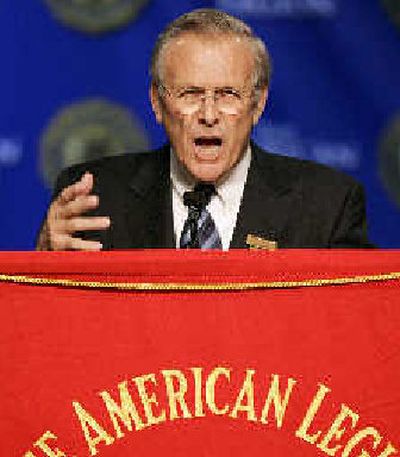Rumsfeld links Bush critics, Nazi appeasers

SALT LAKE CITY – Defense Secretary Donald Rumsfeld compared critics of the Bush administration to those who sought to appease the Nazis before World War II, warning Tuesday that the United States is confronting “a new type of fascism.”
Rumsfeld, speaking before the American Legion convention, delivered some of his most explicit and extended attacks yet on the administration’s critics, provoking criticism from furious Democrats who accused him of “campaigning on fear.”
By comparing U.S. foreign policy with World War II and the Cold War, Rumsfeld sought to portray skeptics of Bush’s foreign policy as being on the wrong side of history. Rumsfeld again ridiculed American officials who, before World War II, wished to negotiate with Adolf Hitler.
“I recount that history because, once again, we face similar challenges in efforts to confront the rising threat of a new type of fascism,” Rumsfeld said. “But some seem not to have learned history’s lessons.”
He continued: “Can we truly afford to believe that, somehow or someway, vicious extremists could be appeased?”
His use of the word “appease” was particularly notable, clearly tying administration critics to the failed efforts of the pre-Churchill British government to mollify Hitler.
Rumsfeld has become one of the Bush administration’s most divisive figures, and demands for his resignation have become a litmus test in congressional races around the country as Iraq confronts deepening violence and civil strife.
Nevertheless, Rumsfeld aggressively defended the war and his leadership of it in speeches to the American Legion on Tuesday, the Veterans of Foreign Wars a day earlier and in other meetings with service members this week.
In each speech, Rumsfeld has acknowledged the reality of debate in a free society. But he has attacked the news media, charging that reports have been manipulated by Iraqi insurgents or al-Qaida terrorists. He has suggested that negative news stories and criticism of the war sap the nation’s will to fight in Iraq.
“The struggle we are in is too important – the consequences too severe – to have the luxury of returning to the ‘blame America first’ mentality,” Rumsfeld told the American Legion. “Can we truly afford to return to the destructive view that America – not the enemy – is the real source of the world’s troubles?”
Rumsfeld’s view of Bush administration critics contrasted with that of Secretary of State Condoleezza Rice, who in a speech to the same Legion convention later Tuesday took a softer tone.
“On the one hand, Americans want desperately to succeed in Iraq. They want to do whatever it takes to achieve victory,” Rice said. “But on the other hand, there are unsettling questions. Is success possible? Is it really worth the effort?”
Rice said she believed the American strategy in Iraq was working, and that the U.S. military must remain in the country or risk handing a victory to violent extremists in the Middle East.
“If we abandon the Iraqi people, before their government is strong enough to secure the country, then we will show reformers across the region that America cannot be trusted to keep its word,” Rice said. “We will embolden extremist enemies of moderation and of democratic reform.”
Rumsfeld’s speech drew sharp complaints from Democrats, including Sen. Edward M. Kennedy of Massachusetts, whose father, Joseph P. Kennedy, was criticized by Rumsfeld in a speech Monday. The elder Kennedy, who served as a U.S. ambassador to Great Britain before World War II, resigned that post because he opposed British and U.S. war preparations.
“Secretary Rumsfeld is the last person who should preach the lessons of history after ignoring them for the last six years,” Kennedy said in a statement. “As a result of his failures, Americans are less safe.”
Both Kennedy and Senate Minority Leader Harry Reid, D-Nev., renewed their call for Rumsfeld to be replaced.
Rumsfeld has not directly identified the administration critics he has attacked. But he pointed to “a focus on dividing our country” and has listed what he considered missteps or mistakes by the news media.
For instance, he said news outlets have carried more reports about U.S. military abuses than about Army Sgt. 1st Class Paul Smith, who posthumously won the Medal of Honor for heroism during the initial invasion of Iraq.
Rumsfeld was applauded by the American Legion for calling on the group’s members to “set the record straight.”